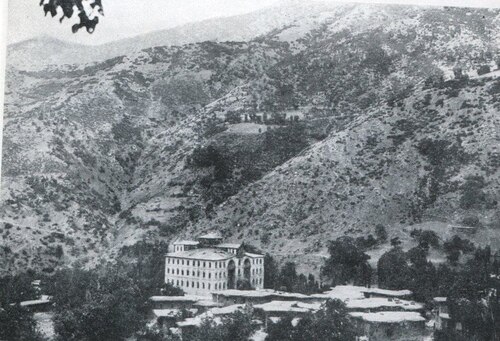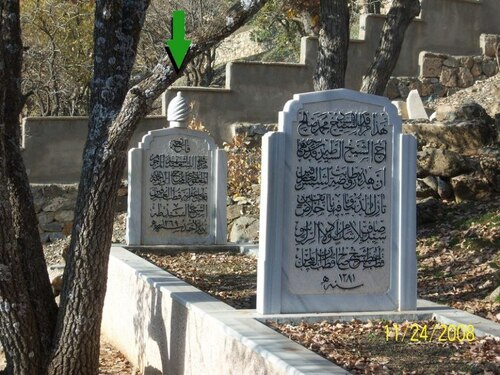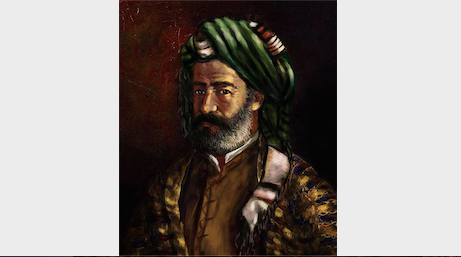Kurdshop - Sheikh Obeidollah, son of Sheikh Taha Nahri, was one of the most famous and powerful leaders of the Naqshbandi Tariqat (a religious branch in Islam) in Kurdistan and was born in 1830.
Sheikh Taha, the father of Sheikh Obeidollah, died in 1853. His oldest son, Sheikh Obeidollah's older brother replaced his father but he also died in 1865. Thus, Sheikh Obeidollah took their place at the age of 34 as the Tariqat's leader. He was an intellectual and knowledgeable poet.
He spent his youth in the emirate of Botan and witnessed the collapse of the largest Kurdish emirate. They had seen the mistakes and shortcomings of this emirate administration. These events had a huge impact on his personality.
After the Botan emirate ended and they got defeated by the Ottomans, there was no power left in Kurdistan. Sheikh Obeidollah knew Kurdistan well from every aspect. During that time, the Kurds united.
When the Russian Ottoman war began in 1877-1878, the Ottoman Sultan wanted the Sheikh to join the army of Bazid. But Sheikh Obeidollah had other plans. His plan was to liberate Kurdistan and its people under the oppression of the Qajar and Ottoman States; thus, he ignored Sultan's demands.
Then after the last month of war, 1400 soldiers under his leadership, 850 soldiers led by Sheikh Jalaluddin, and 400 soldiers under Sheikh Hamza's command took part in the battle.

However, since they did not want to fight and they had seen the Ottoman commander's harsh and inhumane behaviour towards them, they returned to Van City with the weapons they had taken from the Ottomans.
According to some sources, the number of weapons was 4000 and based on other sources, they were more than 2000.
At that time, the situation between the Ottomans and the Qajar was not good. Both of these states had faced some crisis and their economic situation deteriorated; as well as they were both engaged in war: Qajar with the Turkmen and the Ottoman with the Russians and the Balkans.
All these events led Sheikh Obeidollah to think about the establishment of a Kurdish state and unifying the two parts of Kurdistan. He believed that he had to take the most important steps as soon as possible.
In order to be able to gain his national rights and create an independent Kurdistan, Sheikh Obeidollah contacted most of the political parties.
He sent letters and communicated with the British and Russian consuls in Van, Erzurum, Tabriz and their missionaries in Urmia and elsewhere via his messengers. He clearly conveyed the situation of the Kurdish people in those letters.
Sheikh Obeidollah began to negotiate and meet with the parties and even with his opponents to discuss Kurdistan's liberation.
After all these efforts and negotiations, Sheikh Obeidollah invited all the caliphs of Tariqat, Sheikhs, Lords and the clans' chiefs in Kurdistan, from Hawraman to Erzurum, to talk and cooperate on the issue of Kurdistan. He formed a council and discussed the strategy and tactics of the uprising with them.
According to sources and investigations on that uprising, meetings were held in Nahriyeh at Sheikh Obeidollah's base in 1880 between July and early August with the participation of 5 Sheikhs, 21 caliphs, and 42 Emirs. The strategy and tactics of the uprising had been debated for a long time. Several organizations had been established and well-known figures of Kurdistan were elected to lead them.

In the end, the result of those decisions and conclusions of the council or based on some sources of the "Kurdistan Community" were as follows:
1. Sheikh Obeidollah became the leader of that centre.
2. Bahri Bag, the son of Great Badr Khan, became the administer.
The goals were:
1. The liberation of Kurdistan from the oppression of the Ottomans and the Qajar.
2. Establishment of an independent and united Kurdistan State on both parts of Qajar and Ottomans.
3. The election of Sheikh Obeidollah Nahri as the ruler of Kurdistan.
4. Alliance with the Armenians of Kurdistan.
5. Establishing the branches of this Community in cities of Kurdistan.
6. This Community possessed 4000 Martin rifles, 200 of which were Iranian and the rest were Turkish.
7. Most of the presidents of all of Kurdistan could be members of this group.
Researchers believe that this community was the first political Kurdish Community and a Kurdish organization and Party.
According to the documents and reliable studies, Sheikh Obeidollah Nahri gave a series of speeches in this Community as follows:
"My dear ones!
We need to listen to our elders' and ancestors' advice. We should no longer accept the Turks' authority over our nation. We need to liberate ourselves. Not only we, who are under the Ottomans' control, but we also have to liberate our Kurdish brothers from Qajar authority, too. These two states have stopped our nation's development. Our ancestors want us to liberate our religion and nation at any cost even with our lives.
Scholars have said that taking advantage of the current opportunities is wise. Qajar is currently engaged in fighting against the Turkmen and they have sent all their forces to fight Turkmen which means it is a good opportunity for us to take action against the Qajar government. We are not afraid of the Persians because even if they were not engaged in fighting, even if they had a large army, they would not have more than one hundred thousand armed soldiers, the majority of whom will be our Kurdish brothers whom Qajar tries to destroy them anyway and they share the same spirit and feelings as ours. A part of Kurdistan's fertile land is under Qajar's control; we need to take a step, and we have to start a war against our enemies. We must liberate our brothers and nation in that part of Kurdistan. This will give us a rich resource. They will help us in fighting and resisting our greater enemy, the Ottoman Turks."

After these preparations, it was decided to start fighting in the eastern part of Kurdistan under the control of Qajar. Two fronts were formed there. One front was in Shino (Oshnaviyeh), Mahabad, and Miyandoab under the command of Sheikh Abdulqader, son of Sheik Obeidollah, and Hamza Agha Mangur; the other front was directly under Sheikh Obeidollah's command in Urmia.
The front-line forces commanded by Sheikh Abdulqader and Hamza Agha Mangur liberated Shino, Mahabad, Miyandoab and those areas that were close to these cities.
This force arrived in Sablagh on Wednesday afternoon September 29, 1880, and a day later on Thursday, September 30, 1880, Khan Baba Khan, son of Majid Khan, was appointed the commander of Sablagh.
On the afternoon of December 20th, 1880, Sheikh Obeidollah himself arrived near Urmia and he waited in Barandz for all the forces to come and gather. A few hours later, when other forces arrived, they all marched towards Urmia with Sheikh Obeidollah's forces.
The number of troops who were with Sheikh was 12 thousand soldiers. Sheikh's goal in creating these two forces was:
1. Liberating Urmia and its surrounding areas.
2. Reducing the pressure of Qajar forces on Sheikh Abdulqader and Hamza Agha's troops that had made the Qajar forces go to Urmia.
Sheikh Obeidollah's forces made several bonfires around Urmia city on the high hills and mountains to show Urmia people how large their forces were.

After Miyandoab's heroic battle, the Kurdish forces killed hundreds of Qajar soldiers. Based on some sources, two thousand armed forces of Qajar in Miyandoab were killed by the Kurdish forces. Finally, Qajar's troops invaded Miyandoab and they burned most of the villages around this city.
Sheikh Obeidollah also attacked Urmia several times but he was not successful in seizing the city. The Kurdish troop passed through the Margawar region towards Urmia. Although they besieged Urmia several times, they were not able to liberate the city and the Kurdish forces were defeated.
Sheikh Obeidollah returned to Nahri after their failure. The first reason for Sheikh Obeidollah's failure in Urmia was Qajar's diplomacy. Since the British, Russians and the Ottomans cooperated with the Qajar, the Kurdish forces could not be successful.
Later, the Ottomans invited Sheikh Obeidullah to Van to discuss the region's issue and help him out, but instead, they arrested him and sent him to Istanbul. In July 1882, Sheikh Obeidollah began his uprising again. He formed an army of 5000 soldiers. Sheikh and his troops continued their resistance in Urmar Castle until September 1882. However, the Ottomans brought a very large army to attack Sheikh's forces. They exiled Sheikh to Hijaz in Saudi Arabia.
Sheikh Obeidollha lived in Mecca until 1883 and he died the same year in Mecca. He recorded his name in the history of Kurdistan forever.








